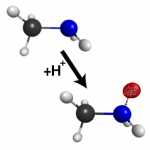Ab Initio Multicomponent Methods

An accurate inclusion of nuclear quantum effects is important for a correct description of many chemical phenomena including zero point energy, hydrogen tunneling, and proton-coupled electron transfer. One promising class of methods for including nuclear quantum effects in quantum chemistry calculations are multicomponent self-consistent field methods (SCF), where electrons and select nuclei are both treated fully quantum mechanically by not invoking the Born-Oppenheimer approximation for the select nuclei.
We have developed a wide variety of multicomponent methods including the first multicomponent generalization of the (T) correction in multicomponent coupled-cluster theory. Our current research interest include developing new multicomponent methods in combination with the constrained formalism of the Yang group and the application of multicomponent methods to hydrogen-bonded and proton-transfer systems.
